In today’s data-driven landscape, rotating residential proxies have become essential not only for technical teams but also for founders, CEOs, ecommerce operators, agencies, and growth-focused organizations. They provide the ability to collect market data, verify ads, run automation, and maintain multi-region visibility — all without triggering blocks or detection.
But cost matters. Many businesses don’t need the most expensive, enterprise-only proxy platforms. They need affordable rotating residential proxies that deliver real value: predictable performance, legitimate residential IPs, and the flexibility to scale up or down depending on demand.
This guide breaks down what “affordable” really means, what to look for, and which providers stand out for delivering the best balance between price and real-world usability.
What Does “Affordable Rotating Proxy” Mean?
Affordability in the proxy industry is not just about finding “the cheapest” provider. Low cost alone is meaningless if the proxies underperform, trigger bans, or waste your bandwidth.
For a proxy service to be truly affordable, it must combine reasonable pricing with reliable performance, scalability, and transparent usage policies.
Below are the core criteria that define an affordable rotating residential proxy.
(These same criteria will be used later in the comparison section.)
1. Price-to-Performance Ratio
An affordable provider must offer competitive cost per GB or monthly plan pricing without sacrificing quality.
Key factors:
- Fair cost relative to IP quality
- No unnecessary markups for basic features
- Pricing that remains predictable as usage grows
2. Rotation Quality & Stability
The rotating mechanism must provide:
- Stable switching intervals
- Low error rates during rotation
- Consistent availability of fresh IPs
Cheap services often fail here — high error rates mean wasted queries and extra costs.
3. Real Residential IPs
Affordability does not mean datacenter IPs disguised as “residential.”
A legitimate affordable service must include:
- Genuine residential addresses from real devices
- Clean IP reputation
- Minimal detection across major platforms
4. Clear, Transparent Billing
A key affordability factor:
- No hidden fees
- Clear GB accounting
- Easy scaling (up & down)
- “Pay for what you use” models when possible
5. Geo-Targeting Flexibility
Affordable doesn’t mean limited.
An ideal service should include:
- Multiple countries
- City-level targeting when needed
- Consistent coverage rather than bloated, inaccurate lists
Cheap providers often advertise huge geo lists but lack real inventory.
6. Protocol Support (SOCKS5 + HTTP/HTTPS)
Rotating proxies must integrate into:
- Automation tools
- Ad verification flows
- Scraping environments
- Anti-detect browsers
SOCKS5 support is essential for performance, encryption, and compatibility.
7. Dashboard Usability & Monitoring Tools
A genuinely affordable platform reduces operational time and overhead.
This includes:
- Real-time analytics
- Clear traffic reports
- Simple rotation controls
- Easy onboarding for teams
Best Affordable Rotating Proxy Providers
1. GonzoProxy
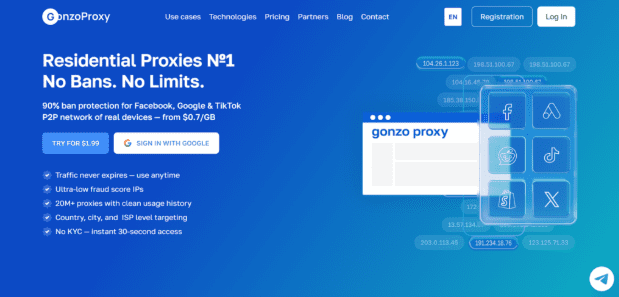
Overview
GonzoProxy is a rotating residential proxy service built for performance-focused businesses that need flexibility in cost and scalability. It provides access to a large pool of real residential IPs with automatic rotation, SOCKS5/HTTP support, and granular geo-targeting (country, city, ISP).
Its key strength — predictable cost control through a clear pay-as-you-go model — makes it especially attractive for businesses that want premium performance without enterprise-level price tags. GonzoProxy positions itself as a strong solution for anyone looking for a reliable yet affordable rotating residential proxy setup.
Advantages
- Real residential IPs sourced from real user devices
- Automatic rotation with stable switching intervals
- Pay-as-you-go traffic model keeps costs transparent
- Supports SOCKS5 + HTTPS for automation and scraping tools
- Simple, intuitive dashboard with real-time usage metrics
Evaluation Criteria — Q&A
Q: Is it affordable based on price-to-performance?
A: Yes. Because you pay only for the traffic you use, you avoid inflated monthly commitments while retaining high-quality residential rotation.
Q: How stable is the rotation mechanism?
A: Rotation is smooth and consistent, with low error rates according to user feedback — meaning less wasted bandwidth.
Q: Are the IPs genuinely residential?
A: Yes. The IP pool consists of real residential devices, helping maintain strong deliverability on sensitive websites.
Q: Is billing transparent?
A: Extremely. Traffic consumption is shown live, and you only pay for actual usage.
Q: How flexible is geo-targeting?
A: Very flexible — country, city, and ISP targeting is supported.
Q: Does it support essential protocols?
A: Yes — SOCKS5, HTTP, and HTTPS compatibility ensures broad integration with tools and workflows.
Q: How user-friendly is the platform?
A: The dashboard is straightforward, with rotation controls and traffic analytics accessible even to non-technical teams.
2. Mango Proxy
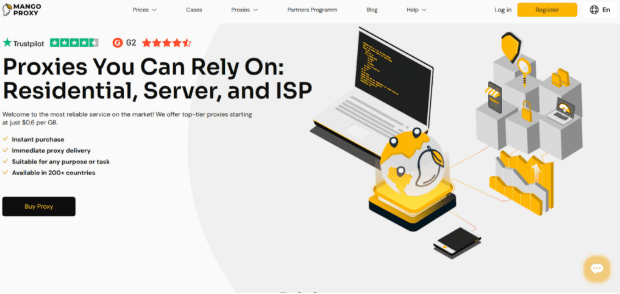
Overview
Mango Proxy is positioned as an accessible entry-level residential proxy provider offering rotating IPs at relatively low cost. It is often chosen by smaller teams, beginners in scraping, or projects with lightweight data workloads. While not matching the performance of top-tier providers, it delivers a workable balance of price and features for basic needs.
Advantages
- Lower-cost entry plans compared to many competitors
- Simple, beginner-friendly interface
- Suitable for low-to-moderate scraping volumes
Evaluation Criteria — Q&A
Q: How strong is the price-to-performance ratio?
A: Good for basic workloads, but performance may fluctuate under high demand or on complex targets.
Q: How stable is rotation?
A: Rotation works adequately for small tasks but can show inconsistencies during large-scale scraping.
Q: Are the IPs genuinely residential?
A: Yes, but reviews indicate variability in IP cleanliness depending on region.
Q: Is billing transparent?
A: Pricing is simple, though fewer flexible options exist compared to premium pay-as-you-go models.
Q: How flexible is geo-targeting?
A: Coverage is solid at the country level but limited granularity beyond that.
Q: Protocol support?
A: Standard HTTP/HTTPS support; SOCKS5 availability may depend on plan.
Q: Ease of use?
A: Interface is beginner-friendly, with minimal setup requirements — good for smaller teams.
3. Asocks
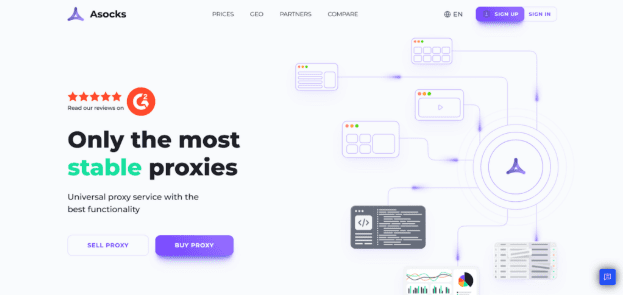
Overview
Asocks is known for offering one of the most aggressive pricing models in the residential proxy market — a flat-rate, unlimited-requests approach. This has made it popular among users who prioritize cost minimization above premium performance. Asocks is suitable for projects needing broad IP rotation at scale but not strict enterprise-grade reliability.
Advantages
- Very low cost compared to competitors
- Unlimited requests on most plans
- Straightforward setup with minimal onboarding friction
Evaluation Criteria — Q&A
Q: Does Asocks offer strong price-to-performance value?
A: Yes for budget-sensitive users. It’s one of the most affordable services, though performance is not always consistent across geographies.
Q: How stable is the rotation mechanism?
A: Rotation works, but error rates and inconsistent speeds have been reported — acceptable for non-critical workloads.
Q: Are the IPs genuinely residential?
A: Yes, though cleanliness varies. Users occasionally report repeat IPs or lower reputation addresses.
Q: Is billing transparent?
A: Very. Pricing is flat and easy to understand, with unlimited requests being the main selling point.
Q: How flexible is geo-targeting?
A: Good country-level coverage; city-level precision is more limited.
Q: Protocol support?
A: Supports standard HTTP/HTTPS; SOCKS5 availability varies by plan or region.
Q: Ease of use?
A: The dashboard is simple and minimalistic — suitable for new users without technical backgrounds.
4. Ace Proxies

Overview
Ace Proxies provides rotating residential and mobile proxy solutions with an emphasis on automation tasks, social accounts, and lightweight scraping. It positions itself as a mid-tier service: more stable than ultra-budget providers, yet still affordable compared to premium enterprise platforms.
Advantages
- Balanced pricing for residential and mobile proxies
- Broad device-type options (including mobile)
- Rotating and sticky sessions available
Evaluation Criteria — Q&A
Q: How competitive is the price-to-performance ratio?
A: Moderate to good. Pricing is fair, and performance is generally stable for mid-volume tasks.
Q: How stable is the rotation mechanism?
A: Rotation is consistent for typical workloads. Larger-scale enterprise scraping may require more robust alternatives.
Q: Are the IPs genuinely residential?
A: Yes. IPs come from residential and mobile sources, though pool size is smaller than leading providers.
Q: Does billing feel transparent and predictable?
A: Yes — plans are clearly outlined, without complex overage charges.
Q: How flexible is geo-targeting?
A: Decent global coverage at country level; fewer options for city/ASN targeting.
Q: Protocol support?
A: Standard HTTP/HTTPS support; SOCKS5 typically available depending on configuration.
Q: How is the user experience?
A: The dashboard is functional and easy to navigate, but lacks deeper analytics for high-end operational teams.
5. ProxyRack

Overview
ProxyRack is a long-standing proxy provider offering residential, datacenter, and mixed network solutions. It positions itself as a mid-range option with broad IP coverage and unlimited bandwidth plans — making it attractive for teams that want predictable spending and steady rotation without committing to enterprise-level costs. While not the fastest provider in the market, ProxyRack offers reliable value for medium-scale data acquisition, monitoring, and automation tasks.
Advantages
- Unlimited bandwidth plans available
- Large proxy pool covering many regions
- Predictable monthly pricing
- Wide variety of proxy types (residential, datacenter, hybrid)
Evaluation Criteria — Q&A
Q: How good is ProxyRack’s price-to-performance ratio?
A: Strong for medium-volume users. Unlimited bandwidth plans offer predictable costs, though raw performance may lag behind premium competitors.
Q: How stable is the rotation quality?
A: Rotation is generally consistent, but tests and user reviews show occasional slowdowns during peak hours.
Q: Are the IPs genuinely residential?
A: Yes — ProxyRack uses real residential and mixed network IPs, though IP reputation varies by region.
Q: Is billing predictable and transparent?
A: Yes. Unlimited-bandwidth subscriptions make budgeting straightforward.
Q: How flexible is geo-targeting?
A: Good country-level selection; city-level accuracy is less consistent.
Q: Protocol support?
A: Supports HTTP/HTTPS and SOCKS5, ensuring compatibility with most automation tools.
Q: How strong is the dashboard and UX?
A: Functional and clear; not feature-heavy, but sufficient for operational tasks.
6. Nimbleway
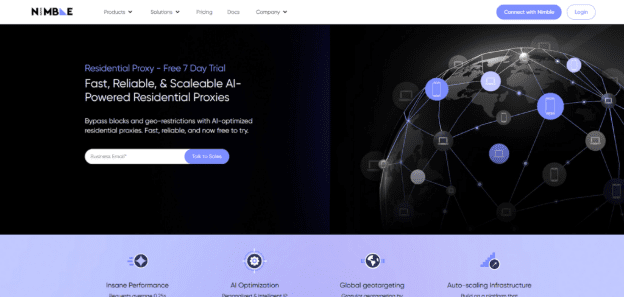
Overview
Nimbleway is a data automation and proxy infrastructure provider offering rotating residential, mobile, and datacenter IPs. Positioned toward growth-oriented businesses, Nimbleway emphasizes automation, high reliability, and built-in tools for data gathering. However, it leans toward the premium side of affordability — offering strong performance, but at higher cost compared to budget-focused competitors.
Advantages
- High success rates on complex targets
- Built-in tools for crawlers, data pipelines, and automation
- Strong network stability and session management
- Wide protocol and geo support
Evaluation Criteria — Q&A
Q: Is Nimbleway affordable from a price-to-performance perspective?
A: It provides excellent performance, but pricing is higher than typical budget providers. It’s “affordable” primarily for teams needing reliability over cost savings.
Q: How stable is rotation?
A: Very stable. Nimbleway’s rotation system is one of the strongest for complex enterprise sites.
Q: Are the IPs genuinely residential?
A: Yes — the platform sources clean residential IPs with strong reputation scores.
Q: How transparent is the billing structure?
A: Mostly clear, although higher base pricing means it’s less suitable for cost-sensitive operations.
Q: How flexible is geo-targeting?
A: Wide global coverage with detailed targeting options.
Q: Protocol support?
A: Full support for HTTP/HTTPS and SOCKS5, plus automation APIs.
Q: What about dashboard and user experience?
A: Clean, polished UI with advanced monitoring — more enterprise-oriented than beginner-friendly
7. Proxy-Store
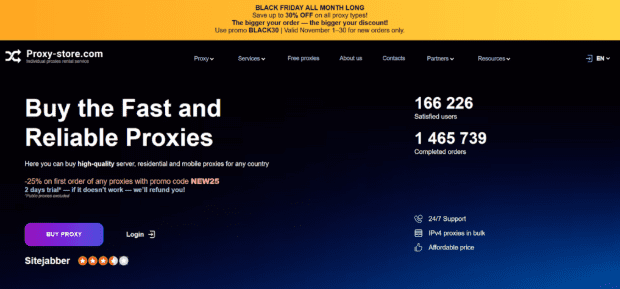
Overview
Proxy-Store is a budget-friendly proxy provider offering rotating residential, mobile, and datacenter IPs. It markets itself mainly to cost-conscious users who need basic rotation and access to multiple locations without the operational complexity of enterprise tools. While its IP pool and infrastructure are smaller than industry leaders, Proxy-Store offers an approachable entry point for individuals and small teams testing lightweight automation or localized scraping tasks.
Advantages
- Competitive pricing for rotating residential IPs
- Simple, straightforward dashboard
- Affordable access to mobile proxies
- Low entry barrier for smaller projects
Evaluation Criteria — Q&A
Q: How strong is the price-to-performance ratio?
A: Good for low-volume workloads. Proxy-Store is priced attractively, though performance, rotation quality, and IP reputation may vary compared to premium providers.
Q: How stable is the rotation mechanism?
A: Reasonably stable for basic scraping, but can be inconsistent on websites with strong anti-bot protections.
Q: Are the IPs genuinely residential?
A: Yes, but with a smaller pool. Some reviews note occasional reuse of IPs depending on region.
Q: Is billing transparent and flexible?
A: Yes. Plans are simple and easy to understand, without complicated overage models.
Q: How flexible is geo-targeting?
A: Supports country-level targeting; detailed city or ISP granularity is limited.
Q: Protocol support?
A: Offers standard HTTP/HTTPS, with SOCKS5 generally available on residential plans.
Q: How user-friendly is the dashboard?
A: Easy to navigate with straightforward setup — suitable for beginners, but not feature-rich for advanced teams.
8. Honeygain Proxies

Overview
Honeygain Proxies (also known through the “JumpTask / Honeygain network”) leverages a shared bandwidth marketplace, offering access to rotating residential IPs sourced from users who opt-in through the Honeygain application. This model allows for very low-cost residential traffic, making it one of the most affordable options on the market — though performance and consistency can fluctuate due to the nature of crowdsourced IP pools.
Advantages
- Extremely low-cost access to residential IPs
- Massive global reach due to user-sourced network
- Minimal onboarding requirements
Evaluation Criteria — Q&A
Q: Is Honeygain affordable from a price-to-performance standpoint?
A: Yes — it is one of the cheapest residential proxy networks available. However, cost savings come with variability in speed and reliability.
Q: How stable is rotation?
A: Rotation occurs naturally through the peer-to-peer model, but consistency depends heavily on network availability at the moment.
Q: Are the IPs genuinely residential?
A: Yes. All IPs come from home devices using Honeygain’s app, giving high residential authenticity.
Q: Is the billing transparent?
A: Very. The pricing is simple, but the quality is tied to the crowdsource nature of the network.
Q: How flexible is geo-targeting?
A: Global coverage is broad, but specific city-level targeting is unpredictable because it depends on active contributors in that area.
Q: Protocol support?
A: Typically supports basic HTTP/HTTPS; SOCKS5 support varies depending on integrations.
Q: Dashboard & UX?
A: Minimalistic and straightforward — easy for new users, but lacks advanced monitoring tools.
Compare List of Providers
Below is a unified comparison of all eight rotating residential proxy providers, based on the affordability criteria established earlier:
price-to-performance, rotation stability, residential authenticity, billing transparency, geo-targeting, protocol support, and dashboard usability.
Comparison Table – Affordable Rotating Residential Proxies
| Provider | Price-to-Performance | Rotation Stability | Residential Authenticity | Billing Transparency | Geo-Targeting | Protocol Support | Dashboard & UX | Best For |
| GonzoProxy | Excellent — strong value with pay-as-you-go | Very stable | Real residential IPs | Highly transparent | Country / City / ISP | SOCKS5 + HTTP/HTTPS | Clean, intuitive | Scalable business scraping & automation |
| Mango Proxy | Good for small budgets | Moderate — can fluctuate | Residential, varies by region | Simple, limited options | Country-level | HTTP/HTTPS (SOCKS5 varies) | Beginner-friendly | Light scraping, small teams |
| Asocks | Extremely affordable; unlimited requests | Inconsistent under load | Residential (cleanliness varies) | Very transparent | Country-level | HTTP/HTTPS (SOCKS5 depends) | Minimalistic | High-volume, low-priority tasks |
| Ace Proxies | Fair, balanced for mid-range users | Stable for mid-volume tasks | Residential + mobile | Predictable | Country-level | HTTP/HTTPS + SOCKS5 | Easy to use | Social automation, mid-tier scraping |
| ProxyRack | Strong for unlimited bandwidth plans | Generally consistent | Residential + mixed pools | Predictable monthly | Country-level | SOCKS5 + HTTP/HTTPS | Functional, simple | Medium-scale projects needing unlimited bandwidth |
| Nimbleway | Good, but higher-priced | Enterprise-grade stability | High-quality residential | Transparent but premium | Wide global / granular | Full support | Advanced, polished | Enterprise workloads, automation, data collection |
| Proxy-Store | Very good for small budgets | Acceptable for basic tasks | Residential (smaller pool) | Clear pricing | Country-level | HTTP/HTTPS + SOCKS5 | Simple | Beginners, low-volume projects |
| Honeygain Proxies | Extremely cheap | Variable (crowdsourced) | 100% residential (peer network) | Straightforward | Depends on active users | HTTP/HTTPS | Basic | Ultra-budget users, non-critical scraping |
End Point
Choosing the right rotating residential proxy provider ultimately comes down to balancing cost with operational reliability. While premium platforms offer excellent performance, they aren’t always necessary for every business. For many growth-focused teams — from startups and digital agencies to ecommerce operators and data-driven CEOs — affordability is about more than the lowest price. It’s about finding a provider that delivers consistent results without unexpected overhead.
GonzoProxy stands out as a strong match for organizations that need predictable pay-as-you-go billing and stable rotation across genuine residential IPs. Mango Proxy, Asocks, and Proxy-Store meet the needs of smaller teams or budget-constrained projects, while ProxyRack offers dependable mid-tier value with unlimited bandwidth options. On the high end, Nimbleway remains a top choice for enterprise workloads where stability, automation tooling, and global IP coverage justify the higher cost.
Each provider in this list offers a unique blend of affordability, functionality, and performance. Understanding how these criteria align with your workflow will allow you to choose the solution that delivers the best long-term value for your business — whether you’re scaling scraping operations, enhancing visibility across markets, or strengthening your digital automation pipeline.






